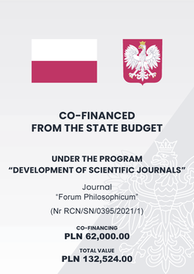- Home »
- Issues »
- 28/1 – Spring 2023 »
- Articles »
Greek Philosophy as a Religious Quest for the Divine
Abstract
Philosophy has always been parasitic on other bodies of knowledge, especially religious thought. Greek philosophy in Italy emerged as a purification of Orphic religious traditions. Orphic votaries adopted various disciplines in the attempt to become divine, which led Pythagoras and Empedocles to define philosophy as a path to divinity. According to Plato and Aristotle, the goal of philosophy is to become “as much like a god as is humanly possible.” Classical Greek philosophy is not the study of the divine but the project of becoming divine, a project which it shares with Christianity. Greek philosophy and Christianity have different paths to the divine, but they share a common aspiratio
Keywords
Cite this article
Murphy, James Bernard. 2023. “Greek Philosophy as a Religious Quest for the Divine.” Forum Philosophicum 28 (1): 85–97. doi:10.35765/forphil.2023.2801.05
Bibliography
Annas, Julia. 1999. Platonic Ethics, Old and New. Ithaca, NY: Cornell University Press. Aristotle. 1984. Complete Works of Aristotle. Edited and translated by Jonathan Barnes et al. Princeton: Princeton University Press. Armstrong, John M. 2004. “After the Ascent: Plato on Becoming Like God.” In Oxford Studies in Ancient Philosophy, edited by David Sedley, 171–83. Oxford: Oxford University Press. Barnes, Jonathan. 2001. Early Greek Philosophy. London: Penguin. Burkert, Walter. 1985. Greek Religion. Cambridge, MA: Harvard University Press. Burnet, John. 1892. Early Greek Philosophy. London: A. and C. Black. Collingwood, R. G. 1998. An Essay on Metaphysics. edited by Rex Martin. Oxford: Clarendon Press. Dewey, John. 2013. A Common Faith. 2 ed. New Haven, CT: Yale University Press. Dworkin, Ronald. 2013. Religion without God. Cambridge, MA: Harvard University Press. Eriksen, Trond Berg. 1976. Bios Theoretikos. Oslo: Universitetsforlaget. Gerson, Lloyd P. 1990. God and Greek Philosophy. London: Routledge. —. 2005. Aristotle and Other Platonists. Ithaca, NY: Cornell University Press. Griswold, Charles L. 1988. “Plato’s Metaphilosophy: Why Plato Wrote Dialogues.” In Platonic Writings, Platonic Readings, edited by Charles L. Griswold, 143–67. New York: Routledge. Guthrie, W.K.C. 1962. A History of Greek Philosophy. Vol. 1. Cambridge University Press: Cambridge Hadot, Pierre. 2002. What is Ancient Philosophy? Translated by Michael Chase. Cambridge, MA: Harvard University Press. Iamblichus. 1991. On the Pythagorean Way of Life. edited by John Dillon and Jackson Herschbell. Atlanta: Scholars Press. Jaeger, Werner. 1939. Paideia. Translated by Gilbert Highet. Vol. 1. Oxford: Basil Blackwell. Kahn, Charles. 1960. Anaximander and the Origins of Greek Cosmology. New York: Columbia University Press. Kant, Immanual. 1998. Critique of Pure Reason. Edited and translated by Paul Guyer and Allen Wood. Cambridge: Cambridge University Press. Kingsley, Peter. 1995. Ancient Philosophy, Mystery, and Magic. Oxford: Clarendon Press. —. 1999. In the Dark Places of Wisdom. Inverness, CA: Golden Sufi Center. Kirk, G.S., Raven, J.E., and Schofield, M., eds. 1983. The Presocratic Philosophers. 2 ed. Cambridge: Cambridge University Press. Laertius, Diogenes. 1980. Lives of Eminent Philosophers. Translated by Robert Drew Hicks. Cambridge: Harvard University Press. Lavecchia, Salvatore. 2006. Una via che conduce al divino: La homoiosis theo nella filosofia di Platone. Milan: Vita e Pensiero. Lazerowitz, Morris. 1970. “A Note on ‘Metaphilosophy’.” Metaphilosophy 1 (1): 91–91. https://doi.org/10.1111/j.1467-9973.1970.tb00792.x. Long, A. G. 2019. Death and Immortality in Ancient Philosophy. Cambridge: Cambridge University Press. Meconi, David Vincent. 2008. “Becoming Gods by Becoming God’s: Augustine’s Mystagogy of Identification.” Augustinian Studies 39 (1): 61–74. https://doi.org/10.5840/augstudies20083917. Merki, Hubert. 1952. Homoiōsis Theōi. Freiburg in der Schweiz: Paulusverlag. Moore, Christopher. 2020. Calling Philosophers Names. Princeton, NJ: Princeton University Press. Most, Glenn. 2003. “Philosophy and Religion.” In The Cambridge Companion to Greek and Roman Philosophy, edited by David Sedley, 300–22. Cambridge: Cambridge University Press. Nestle, Wilhelm. 1975. Vom Mythos zum Logos. Stuttgart: A. Kr.ner. Peterson, Sandra. 2011. Socrates and Philosophy in the Dialogues of Plato. Cambridge: Cambridge University Press. Plato. 1997. Complete Works. Edited and translated by John M. Cooper et al. Indianapolis, IN: Hackett Publishing. Roloff, Dietrich. 1970. Gott.hnlichkeit, Verg.ttlichung und Erh.hung zu seligem Leben. Berlin: De Gruyter. Rutenber, Culbert. 1946. The Doctrine of the Imitation of God in Plato. New York: King’s Crown Press. Sedley, David. 2000. “The Ideal of Godlikeness.” In Plato 2: Ethics, Politics, Religion, and the Soul, edited by Gail Fine, 309–28. Oxford: Oxford University Press. Toit, David S. du. 1997. Theios Anthropos. Tübingen: J.C.B. Mohr. Tor, Shaul. 2017. Mortal and Divine in Early Greek Epistemology. Cambridge: Cambridge University Press. Torri, Paoli. 2017a. “Homoiōsis Theōi: A Study of the Telos in Middle Platonism.” PhD diss., University of Milan and KU Leuven. —. 2017b. “Quale dio per quale vita?: Una interpretazione del τέλος platonico dell’assimilazione a dio nel Didaskalikos di Alcinoo.” Philologus 161 (2): 232–48. https://doi.org/10.1515/phil-2017-0012. Vernant, Jean-Pierre. 1982. The Origins of Greek Thought. Ithaca, NY: Cornell University Press. Zhmud, Leonid. 2012. Pythagoras and the Early Pythagoreans. Translated by Kevin Windle and Rosh Ireland. Oxford: Oxford University Press. Zovko, Marie-.lise. 2018. “Worldly and otherworldly virtue: Likeness to God as educational ideal in Plato, Plotinus, and today.” Educational Philosophy and Theory 50 (6-7): 586–96. https://doi.org/10.1080/00131857.2017.1373340.





